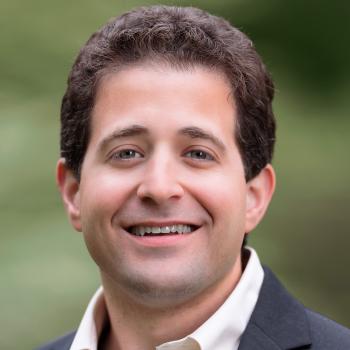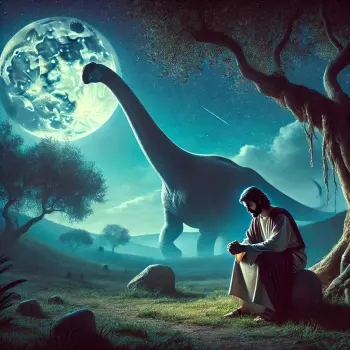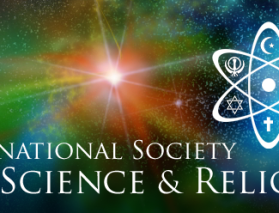Science, Religion, and Deep Time
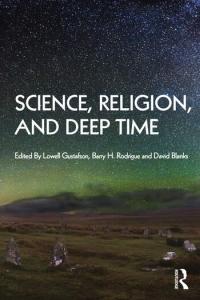
Science, Religion, and Deep Time? How do these fit together?
I’m re-reading an edited book I highly recommend to Patheos readers. It’s Science, Religion, and Deep Time, edited by big historians Lowell Gustafson, Barry H. Rodrigue, and David Blanks. This gallant and handsome volume tries to solve the puzzle: why doesn’t religion fit neatly into Big History? I contributed one chapter. But that’s beside the point. I’m not bragging about the collection because of my contribution. The book merits plaudits on its own without me.
What is Big History again?
In the event that Big History (abbreviated BH) is new to you, let me describe it briefly. It’s an academic field. It’s a new field being introduced into undergraduate curricula in many countries. The chief textbook is Big History Between Nothing and Everything (Christian, David, Cynthia Stokes Brown, and Craig Benjamin, eds 2014).
BH is a field encompassing field that tells the story of everything. Everything from the Big Bang to planet formation to evolution and even to contemporary civilization. This requires deep time: 13.8 billion years from the Big Bang to today. According to the International Big History Association…
“Big History seeks to understand the integrated history of the Cosmos, Earth, Life, and Humanity, using the best available empirical evidence and scholarly methods.”
Evolution Frames Big History’s Worldview

Big historians construct their worldview based on the mega-evolution of all things over deep time driven by emergent complexity. “The idea of emergent complexity is central to Big History accounts,” avers Lowell Gustafson at Villanova University (Gustafson, 2023; 136). All complex things in today’s world evolved from what was once simple. At least according to big historians.
Big historians flock to evolution like teenagers to a rock concert. “Mega-evolution is the chain of transformations that have taken place in the universe over a period of 13.8 billion years” (Nazaretyan 2015, 125), writes Akop Nazaretyan who directs the Eurasian Center for Big History at Moscow State University. In short, BH tells a very big story that expands on evolution.
So, if BH is so big, it must include everything, including religion. Right? Nope! Ooops! For Nazaretyan, mega-evolution presupposes non-theism. “We exclude religious and philosophical doctrines from myths and legends concerning the beginning and the end of the world” (Nazaretyan 2015, 131). Now BH looks like a soufflé recipe with no eggs.
“Mega-evolution, Big History and Universal History give us an impressive non-theistic view of the origins and evolution of the world. It does this by synthesizing the achievements of modern sciences and humanities…As a secular alternative, it addresses both informative and humanistic needs” (Nazaretyan 2015, 139).
Just how do science, religion, and deep time relate? Not harmoniously.
The expunging of theism punctures a tire that causes Big History to swerve away from a harmonious interaction between science, religion, and deep time. Big historians plan to incorporate natural history and human history into their worldview so long as everything fits within a “non-theistic view.”
No wonder religion looks like an odd chapter to fit into this big story!
Collapsing Science, Religion, and Deep Time into Evolution
Can we collapse religion into evolution? Let’s try.
Suppose we say this: religion evolved because it’s adaptive. Religion, therefore, contributes to the survival of our species, Homo sapiens.
Big historians learned this from sociobiologists and evolutionary psychologists. According to big historian Ken Baskin, religion is a “habit of inquiry — a strategy for knowing the world that enabled our evolutionary ancestors to survive in the face of a variety of challenges” (Gustafson, 2023, 143).
Why was religion adaptive? Because it structured human communities around cooperation. Cooperating communities are more likely to survive than non-cooperators. Religion creates in-group identity. And identity is adaptive.
“What gave religion — with its combination of myth and ritual — an evolutionary edge is the way it could fulfill so many functions, including several critical to building coherent communities — a shared way of interpreting the world, for instance, a shared identity, and shared behavioral guidelines” (Gustafson, 2023, 144).
I think we did it. This now means the non-theistic big historian can fit religion into the story as just one more evolutionary chapter. Whew! Problem solved. Right?
What does Big History presuppose?
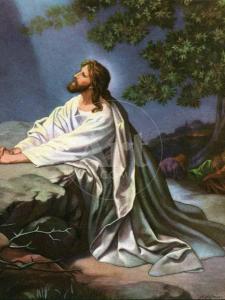
Even so, religion fits into Big History like a lone Democrat fits in at a Republican barbecue. This awkwardness has nothing to do with religion’s behavior. Rather, it has to do with presuppositions.
Presuppositions are what we believe before we investigate. What presupposition sets the parameters for Big History’s investigation? Naturalsm. Naturalism as an …ism gets presupposed.
Arkansas Tech University historian David Blanks, for example, illustrates the naturalistic commitment hidden within so-called scientific research.
“My presupposition is that all religious, spiritual and occult beliefs and experiences are natural – not supernatural – and that this is the sense in which they should be investigated” (Gustafson, 2023, 14).
Note how the reduction of supernatural beliefs to naturalism is not a conclusion drawn from the evidence. Rather, it is a presupposition that determines the conclusion before investigation.
Despite this reduction of the supernatural to the natural, Blanks is not unfriendly to theology. He still wants to include theologians in a dialogue.
“Theologians need to be on there [BH committees] too. They do not constitute a threat. They are allies”(Gustafson, 2023, 19).
It appears that theologians just might get invited to a barbecue hosted by big historians.
Transitional Conclusion
I wish to thank Lowell Gustafson, Barry Rodrique, and David Blanks for editing this fine volume. Science, Religion, and Deep Time constitutes an honest attempt to solve a conundrum within Big History’s methodology.

How do we formulate the problem that leads to the conundrum?
We would misformulate the problem if we think it’s a debate between a young earth and deep time. There are conservative and fundamentalist thinkers who simply reject the idea of deep time. They defend a young earth allegedly based on Scripture. The young earth interpretation of Scripture is a dead end, in my judgment. Our big historians are right when they proceed with current science to see just what the concept of deep time can illuminate.
What is the right formulation of the problem? Here’s the way I see it. I do not think the evidence-based method of the big historian warrants the preclusion of theism. When asking about science and religion in deep time, such a presupposition unnecessarily restricts research. I’ve proffered my solution in a book within the BH genre, God in Cosmic History. Here I advocate adding the Axial Breakthrough to the thresholds already identified by the big historians.
I’ve got more to say on this subject. Much more. Get ready to click on the upcoming posts.
Patheos SR 5051 BH 1 Science, Religion, and Deep Time
For more on our analysis of Big History, start clicking.
Patheos SR 5051 BH 1 Science, Religion, and Deep Time
Patheos SR 5052 BH 2 Science and Religion in Big History
Patheos SR 5053 BH 3 Teilhard and Big History
Patheos SR 5054 BH 4 What is history in Big History?
Patheos SR 5055 BH 5 God in Cosmic History
Patheos SR 5056 BH 6 Big History and Evangelical Theology: Roger Olson
Patheos SR 5058 BH 8 Big History, Religious Naturalism, and Ursula Goodenough
Patheos SR 5059 BH 9 Big History and Progressive Christianity: Thomas Lindell
Patheos SR 5060 BH 10 Critique of Ted Peters by Mitchell Diamond
Patheos SR 5061 BH11 Trinitarian Big History: Chris Barrigar
▓
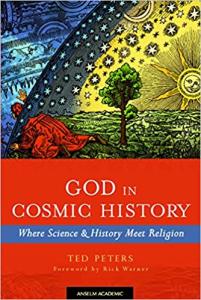
Ted Peters pursues Public Theology at the intersection of science, religion, ethics, and public policy. Peters is an emeritus professor at the Graduate Theological Union, where he co-edits the journal, Theology and Science, on behalf of the Center for Theology and the Natural Sciences, in Berkeley, California, USA. His book, God in Cosmic History, traces the rise of the Axial religions 2500 years ago. He tackled the implications of genetic innovation for the future of humanity in Playing God? Genetic Determinism and Human Freedom? (Routledge, 2nd ed., 2002) as well as For the Love of Children: Genetic Technology and the Future of the Family (Westminster/John Knox 1997). His essays are collected in Science, Theology, and Ethics (Ashgate 2003) The Voice of Public Theology (ATF 2023).
Recently Ted edited AI and IA: Utopia or Extinction? (ATF 2019). Along with Arvin Gouw and Brian Patrick Green, he co-edited the new book, Religious Transhumanism and Its Critics hot off the press (Roman and Littlefield/Lexington, 2022). His fictional spy thriller, Cyrus Twelve, follows the twists and turns of a transhumanist plot.
Visit Ted Peters’ website, TedsTimelyTake.com.
▓
References
Christian, David, Cynthia Stokes Brown, and Craig Benjamin, eds. 2014. Big History Between Nothing and Everything. New York: McGraw Hill.
Davies, Paul. 1983. God and the New Physics. New York: Simon and Schuster.
Gustafson, Lowell; Barry Rodrique, and David Blanks, eds. 2023. Science, Religion, and Deep Time. London: Routledge.
Nazaretyan, Akop. 2015. “Mega-Evolution and Big History.” In Our Place in the Universet: An Introduction to Big History, Volume I, by Leonid Grinin, and Andre Korotayev, eds. Barry Rodrigue, 125-143. Delhi: Primus Books.
Peters, Ted. 2017. God in Cosmic History: Where Science and Big History Meet Religion. Winona MN: Anselm Academic ISBN 978-1-59982-813-8.
Wilson, E O. 2014. The Meaning of Human Existence. London: W. W. Norton.





